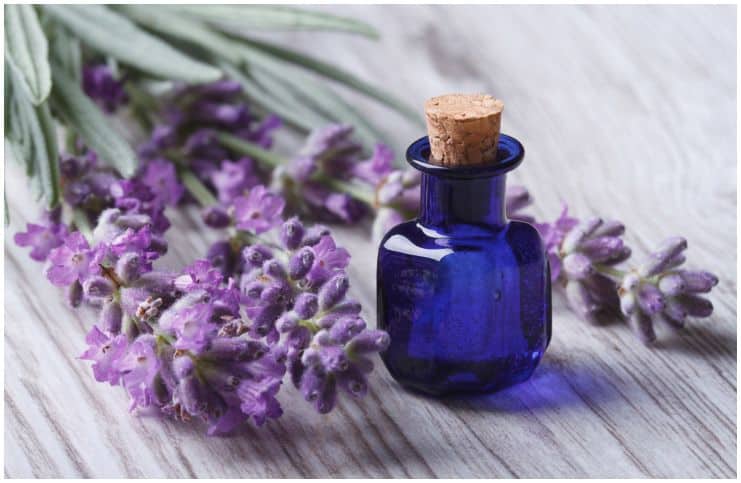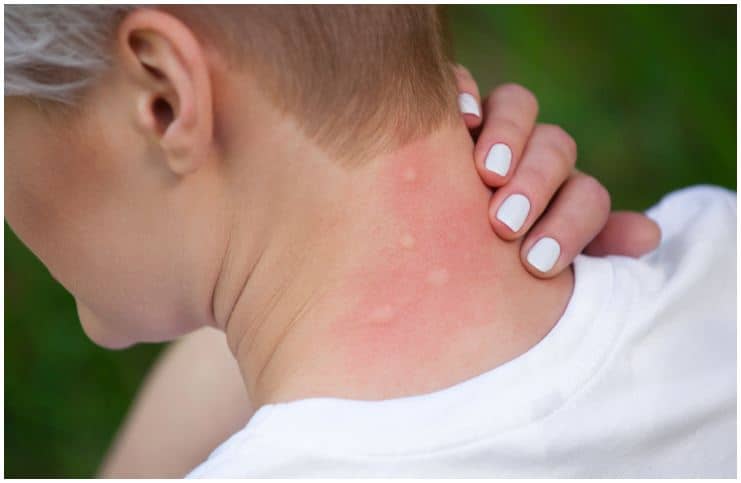Skeeter Syndrome (In Adults) – Symptoms, Causes, Treatment, Prevention:
Skeeter syndrome is the result of a severe allergic reaction to proteins in the mosquito’s saliva that makes the bites even more inflamed and red.
The good news is that in 1 to 3 days after the bite, the swelling will stop, and a few days after, the allergic reaction should subside almost entirely, and there should only be a little red dot left.
If the bite lasts more than 7 days, you may want to go to a health care specialist, particularly if it is an open sore that seems to be getting infected as well if you are dealing with a child who has an allergic reaction to a bite.
Symptoms of Skeeter Syndrome
- large local reactions usually consist of an itchy or painful area of warmth, swelling which ranges from a few 2 cm to more than 10 cm in diameter;
- in very rare cases, angioedema (severe swelling beneath the skin’s surface) may also develop;
- red lumps on the area of the bite itself;
- large bumps appear on other parts of the body than the bite area;
- infection may also occur due to extreme scratching;
- some people can experience anaphylaxis shock that is causing breathing issues, rapid swelling of the throat, and low blood pressure. If you believe that you are experiencing an anaphylaxis shock, seek medical help immediately since you will need an epinephrine shot as soon as possible.
Note – in some cases, some symptoms can be a sign of a side effect of a more serious health condition or a weakened immune system.
Causes
This condition is caused by an allergy to a thinning agent in the mosquito’s saliva, and the extreme reaction can occasionally take up to more than 48 hours to fully develop.
You should also know that the human blood is too dense for a mosquito to suck out; therefore, the insect injects a blood-thinning agent into its prey. Hence, this thinning agent that is occurring in the mosquito’s saliva is the reason for the allergic reaction linked with this syndrome.
Some people who don’t have a history of allergic reactions to insects may suffer from this syndrome, especially if the allergy is of a mosquito species that bites rarely.
Note – children are more susceptible to this type of allergic reaction as their immune system is not fully developed, and it cannot make the specific antibody against the antigen.
Mosquitoes usually like individuals who exhale more carbon dioxide (CO2). In addition, pregnant women are targeted by mosquitoes since they emit more CO2.
Diagnosis
This condition usually develops within a few hours of a mosquito bite. The diagnosis is based on the time of onset of the allergic reaction in relation to a mosquito bite.
Since IgG and IgE are vital players in mosquito allergy, diagnosis can actually be confirmed by an immunosorbent assay (a biochemical technique) measuring IgG and IgE to mosquito saliva antigens.
More importantly, red and swollen areas of skin that are linked with fever and pain should be examined to rule out a possible bacterial infection.
Treatment
Note – it is recommended by doctors to wash the area of a mosquito bite with mild soap and water right after a mosquito has bitten you.
The allopathic treatment usually involves applying topical antihistamines over the affected area or taking oral antihistamines (such as Claritin or Benadryl).
Moreover, topical steroids, like – hydrocortisone, do not seem to help itching and redness but work for rashes associated with bug bites.
Natural Home Remedies for Mosquito Bites
Lavender Essential Oil

Note – it is essential to apply this essential oil as soon as you observe the mosquito bite to reduce any of the adverse reactions that may occur.
Ice
Applying ice for a few minutes after a bite will help to reduce the inflammation and swelling, which can be associated with the mosquito bite.
Baking Soda
Sodium bicarbonate, commonly known as baking soda, is a mild alkaline compound that can help neutralize the pH balance of your skin as well as it may ease your soreness by reducing the inflammation that occurs at the skin’s surface.
Apple Cider Vinegar
It is acidic and relieves the swelling of a bite, and it can be applied directly to affected areas for a few minutes before rinsing off with warm water.
Tea Tree Essential Oil
It has strong antiseptic, antibacterial, anti-inflammatory, and antimicrobial properties that will help relieve swelling, itching, and pain as well as prevent infection.
Epsom Salt
It can ease the allergic reaction of a mosquito bite.
You can apply to the bite area a compress by soaking a washcloth in cold water which has been mixed with Epsom salt.
Aloe Vera Gel
It has mild anti-inflammatory and antihistaminic properties, and it can be applied topically to minimize swelling.
Note – this remedy may cause an allergic reaction if left on the skin for too long.
Prevention
- avoid alcoholic drinks, especially beer, since a few studies have concluded that people who drink beer regularly have more mosquito bites than those who don’t.
- wear appropriate clothing, such as – long sleeves and pants, boots, and hats in areas with mosquitoes.
- choose a mosquito repellent that has been approved and reviewed and which also poses minimal risk to human safety, like – picaridin, lemon eucalyptus essential oil, or DEET.
Tips to Control Mosquitoes Around Your Home
- empty children’s wading pools (mosquitoes lay eggs on the surface of standing water) at least every seven days;
- eliminate standing water around animal watering troughs;
- keep swimming pools chlorinated and cleaned, even when not in use;
- use citronella candles in areas with limited air movement;
- eat garlic regularly since it acts like a barrier (when garlic oil is released from your pores) between your skin and the mosquitoes.
READ THIS NEXT:
Vestibular Papillomatosis vs HPV
Splenic Flexure Syndrome – Symptoms
References https://www.ncbi.nlm.nih.gov/pubmed/25758116 https://wwwnc.cdc.gov/travel/yellowbook/2018/the-pre-trave


